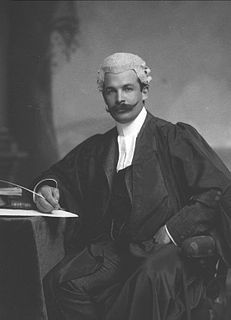Biography
Durant was born in England to William Durant and Alice Pell. Prior to July 1658 he resided for a time in Northumberland County, Virginia, where he had purchased 300 acres (120 ha). He married Ann Marwood on January 4, 1658, and shortly thereafter moved to Nansemond County, Virginia, where he lived for about two years.

England is a country that is part of the United Kingdom. It shares land borders with Wales to the west and Scotland to the north-northwest. The Irish Sea lies west of England and the Celtic Sea lies to the southwest. England is separated from continental Europe by the North Sea to the east and the English Channel to the south. The country covers five-eighths of the island of Great Britain, which lies in the North Atlantic, and includes over 100 smaller islands, such as the Isles of Scilly and the Isle of Wight.
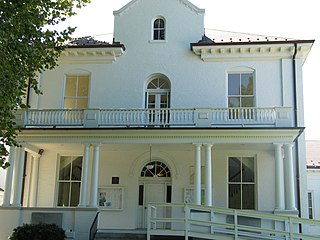
Northumberland County is a county located in the Commonwealth of Virginia. As of the 2010 census, the population was 12,330. Its county seat is Heathsville. The county is located on the Northern Neck and is part of the Northern Neck George Washington Birthplace AVA winemaking appellation.
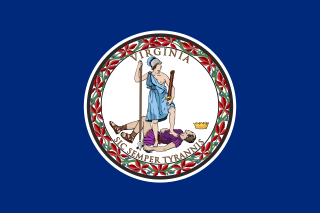
Virginia, officially the Commonwealth of Virginia, is a state in the Southeastern and Mid-Atlantic regions of the United States located between the Atlantic Coast and the Appalachian Mountains. Virginia is nicknamed the "Old Dominion" due to its status as the first English colonial possession established in mainland North America and "Mother of Presidents" because eight U.S. presidents were born there, more than any other state. The geography and climate of the Commonwealth are shaped by the Blue Ridge Mountains and the Chesapeake Bay, which provide habitat for much of its flora and fauna. The capital of the Commonwealth is Richmond; Virginia Beach is the most populous city, and Fairfax County is the most populous political subdivision. The Commonwealth's estimated population as of 2018 is over 8.5 million.
Durant was associated with Nathaniel Batts, a fur trader, and Richard Batts, a sea captain, and together with them explored the Albemarle Sound area of Virginia.

Nathaniel Batts (–1679) was a fur trader, explorer and Indian interpreter. He became the first recorded European to permanently settle in North Carolina in 1655. He often appears as Captain Nathaniel Batts in the records of Norfolk County, Virginia, where his wife owned land by her prior husband, Henry Woodhouse.
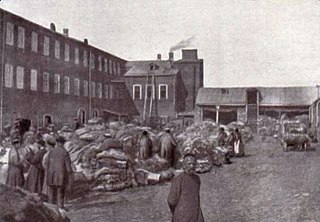
The fur trade is a worldwide industry dealing in the acquisition and sale of animal fur. Since the establishment of a world fur market in the early modern period, furs of boreal, polar and cold temperate mammalian animals have been the most valued. Historically the trade stimulated the exploration and colonization of Siberia, northern North America, and the South Shetland and South Sandwich Islands.
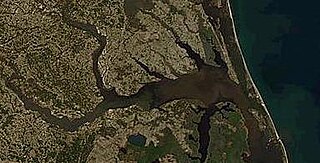
Albemarle Sound is a large estuary on the coast of North Carolina in the United States located at the confluence of a group of rivers, including the Chowan and Roanoke. It is separated from the Atlantic Ocean by the Currituck Banks, a barrier peninsula upon which the town of Kitty Hawk is located, at the eastern edge of the sound, and part of the greater Outer Banks region. Roanoke Island is situated at the southeastern corner of the sound, where it connects to Pamlico Sound. Much of the water in the Albemarle Sound is brackish or fresh, as opposed to the saltwater of the ocean, as a result of river water pouring into the sound.
On August 4, 1661, Durant purchased, in the second oldest recorded deed of the area, [1] [2] land from Cisketando, king of the Yeopim Indian tribe. On March 13, 1662, a second purchase was made from Kilcocanen, another Yeopim. [3] By 1662 Durant was living in Virginia on property adjacent to the Albemarle Sound, which became part of the Carolina colony in 1665. His plantation, called "Wicocombe" (subsequently known as "Durant's Neck"), was located in Perquimans County, North Carolina. The exact location of his home is unknown, but the present town of Durant, on the peninsula between the Perquimans River and the Little River, lies on the neck of land five miles east of Edenton, that was sold to George Durant by the two Indian leaders.

Perquimans County is a county located in the U.S. state of North Carolina. As of the 2010 census, the population was 13,453. Its county seat is Hertford. The county was originally created as Berkeley Precinct. It was renamed Perquimans Precinct around 1684 and gained county status in 1739.

The Perquimans River is a coastal waterway in Northeastern North Carolina in the United States. Located entirely within Perquimans County, the river drains directly to the Albemarle Sound between Durant's Neck on the north and Harvey Neck on the south. It is a tidal estuary to just north of the towns of Hertford and Winfall. Because of the extremely flat topography of the region, the Perquimans flows quite slowly and has cypress swamps on either bank for much of its upper length. It has its headwaters in the swampy region of northern Perquimans and southern Gates counties. It flows past the communities of Nicanor, Whiteston, Belvidere, and the towns of Hertford and Winfall.

Edenton is a town in and the county seat of Chowan County, North Carolina, United States, on Albemarle Sound. The population was 5,004 at the 2010 census. Edenton is located in North Carolina's Inner Banks region. In recent years Edenton has become a popular retirement location and a destination for heritage tourism.
A mariner turned planter, Durant was one of the ablest and most influential men in the county and a leader of the 1677 Culpeper's Rebellion, [4] an uprising over the requirement that all colonial goods be transported in British ships. Durant's open opposition to Seth Sothel, one of the Lords Proprietor, led to his arrest and imprisonment. But when Sothel confiscated 2,000 acres (810 ha) of Durant's property, residents of the Albemarle region rose in defense of Durant and banished Sothel from the area.
Culpeper's Rebellion was a popular uprising in 1677 provoked by the British Navigation Acts. It was led by John Culpeper against the ruling Lords Proprietor in Albemarle County, Province of Carolina, near what is now Elizabeth City, North Carolina. The uprising met with temporary success before being suppressed by English authorities.

Seth Sothel was a colonial American proprietor and governor of the Province of Carolina. He ruled the northern portion, Albemarle Sound, in 1678 and the southern portion from 1690 to 1692. He died in North Carolina in about 1694.
The Durant family Bible, printed in 1599 and brought by Durant to the New World, is displayed in a locked cabinet at the University of North Carolina at Chapel Hill.

The University of North Carolina at Chapel Hill (UNC), also known as UNC-Chapel Hill, Chapel Hill, North Carolina, or simply Carolina is a public research university in Chapel Hill, North Carolina. It is the flagship of the 17 campuses of the University of North Carolina system. After being chartered in 1789, the university first began enrolling students in 1795, which also allows it to be one of three schools to claim the title of the oldest public university in the United States. Among the claimants, the University of North Carolina at Chapel Hill is the only one to have held classes and graduated students as a public university in the eighteenth century.
Durant died on February 6, 1692, at the age of 59.
This page is based on this
Wikipedia article Text is available under the
CC BY-SA 4.0 license; additional terms may apply.
Images, videos and audio are available under their respective licenses.
